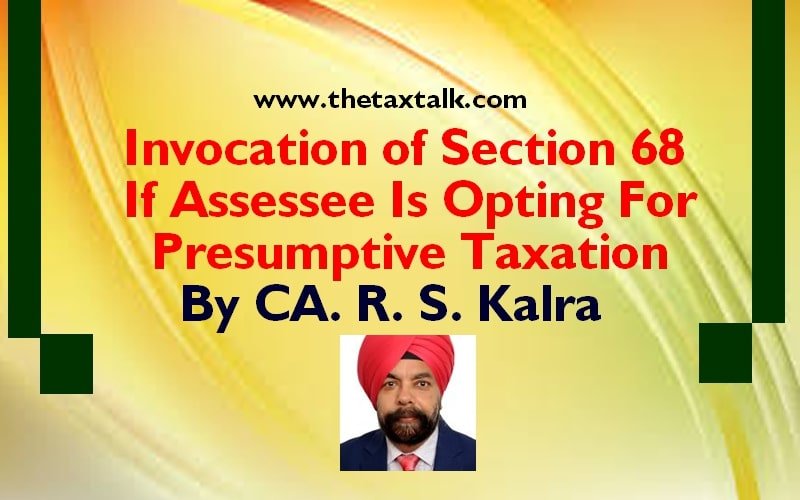![]()
Invocation of Section 68 If Assessee Is Opting For Presumptive Taxation By CA. R.S.Kalra
Author
CA. R.S.Kalra
ca.rskalra@yahoo.com
The basic edifice of presumptive scheme u/s 44AD is assessee would not be called to maintain books under the Act and get them audited if profit shown by assessee is otherwise in accordance with prescription of section 44AD of the Act. But maintaining books of account is sine qua non for making addition under section 68. Since section 44AD does not obligate assessee to maintain books, provisions of section 68 could not be invoked where assessee had filed return of income under provisions of section 44AD without maintaining books of account.
Deposits in bank account maintained by the assessee
This is the case of a person who has filed his return of income under presumptive taxation .He has made certain deposits in his bank account. Now a question arises, whether these deposits in bank can be transformed as unexplained cash credit u/s 68 of the Act.
Before proceeding further to decide this issue it would be imperative to refer to the relevant provisions of section 68 of the Act. The same are reproduced herein under :–
“68. Where any sum is found credited in the books of an assessee maintained for any previous year, and the assessee offers no explanation about the nature and source thereof or the explanation offered by him is not, in the opinion of the assessing officer, satisfactory, the sum so credited may be charged to income-tax as the income of the assessee of that previous year:”
The pre-requisites for invoking the provisions of section 68 are-
(i) any sum is found credited in the books of an assessee.
(ii) the assessee offers no explanation about the nature and source thereof.
(iii) the explanation offered by him is not, in the opinion of the Assessing Officer, satisfactory.
Maintenance of books of account is sine qua non for making addition under section 68
A bare perusal of section 68 of the Act makes explicitly clear that the addition can be made under the section if, any sum is found credited in the books maintained by the assessee. .The Hon’ble High Court of Gauhati in the case of Anand Ram Raitani v. CIT (1997) 223 ITR 544 (Gau) : 1997 TaxPub(DT) 0638 (Gau-HC) has held that existence of books of account is a condition precedent for invoking the provisions of section 68 by the assessing officer. The relevant extract of the judgment is as under :–
“We have gone through section 68 of the Act. The assessing officer before invoking the power under section 68 of the Act must be satisfied that there are books of account maintained by the assessee and the cash credit is recorded in the said books of account and if the assessee fails to satisfy the assessing officer, the said sum so credited has to be charged to income-tax as the income of the assessee of that previous year. The existence of books of account is a condition precedent for invoking of the power. Discharging of burden is a subsequent condition. If the first point is not fulfilled the question of burden of proof does not arise. The assessing officer made the assessment by making addition of the amount for which disallowance was claimed Mr. Bhuyan very candidly admits that addition was made in exercise of the power under-section 68 of the Act, therefore, the first condition necessary for invocation of the power is the existence of the books of account.
Meaning of Books of Accounts
The “books or books of account” have been defined in section 2(12A) of the Act. The same reads as under :–
“2(12A) books or books of account” includes ledgers, day-books, cash books, account-books and other books, whether kept in the written form or as print-outs of data stored in a floppy, disc, tape or any other form of electro-magnetic data storage device;”
The definition of books under the Act is inclusive. A perusal of the definition shows that the same does not include bank passbook or bank statement. A conjoint reading of above provisions would thus lead to the conclusion that the addition under section 68 can be made only where any amount is found credit in the books as defined under section 2(12A) of the Act maintained by the assessee.
A. Books of the assessee and not any other person
It is to be noted that the books in which credit appears should be of the assessee only. Thus, any credit in the books of one person cannot be assessed in the hands of other person u/s. 68 [Shanta Devi vs. CIT – 171 ITR 532 (P&H), Anand Ram Raitani vs. Raitani – 223 ITR 544 (Gau)].
B. Balance sheet and profit and loss accounts are not Books of account. They are just byproducts
The Hon’ble Madras High Court in case of CIT vs. TajBorewell (291 ITR 232) has held that the Profit and Loss Account and Balance Sheet cannot be said to be books of account of the assessee. On the facts of that case, the Court has given the finding that “object of a P&L a/c is to ascertain the income of a business and by offsetting the expenses of earning that income, to ascertain the net increase (profit) or decrease (loss) in the traders’ “net worth” for the period while Balance sheet lists the assets and liabilities and equity accounts of the company. It is prepared ‘as on’ a particular day and the accounts reflect the balances that existed at the close of business on that day.
C. Loose sheet or loose papers are not books of account.
Going by the definition of the books as given by section 2(12A) of the Act, loose sheet found during search could not be treated as books for the purpose of section 68 and also any entry in such sheet cannot be treated a credit entry. The entries in loose papers/sheets are irrelevant and inadmissible as evidence. Such loose papers are not “books of account” and the entries therein are not sufficient to charge a person with liability
-
Common Cause (A Registered Society) v. UOI (2017) 394 ITR 220
-
CB I. v. V. C. Shukla (1998)3 SCC 410
D. Objectives of books of account
In the case of Sheraton Apparels v. Asstt. CIT [2002] 256 ITR 20 (Bom HC) Bombay High Court laid down the following objectives of books of accounts:
Main objectives of the books of account are to maintain a record of business:
-
to calculate profit earned or loss suffered during the period of time;
-
to provide credible data and information to file the tax returns;
-
to depict the financial position of the business;
-
to portray the liquidity position;
-
to provide up to date information of assets and liabilities with a view to derive information so as to prepare a profit and loss account and draw a balance-sheet to determine income and source thereof;
-
It cannot be understood to mean compilation or collections of sheets in one volume;
-
Not diaries which are maintained merely as a man’s private record;
-
Not the ones prepared by him as may be in accordance with his pleasure or convenience to secretly record secret, unaccounted clandestine transactions not meant for the purposes of the Act, but with specific intention or desire on the part of the assessee to hide or conceal income so as to avoid imposition of tax thereon.
e.Whether bank pass book is considered to be books of accounts?
It is to be noted that a bank passbook is not considered as books of account due to following reasons:
-
The relationship between the banker and the customer is one of debtor and creditor and not a trustee and beneficiary.
-
It is only a copy of the constituent’s account in the books maintained by the bank.
-
It is not as if the pass book is maintained by the bank as an agent of the constituent.
-
Nor can it be said that the pass book is maintained by the bank under the instructions of the constituent.


